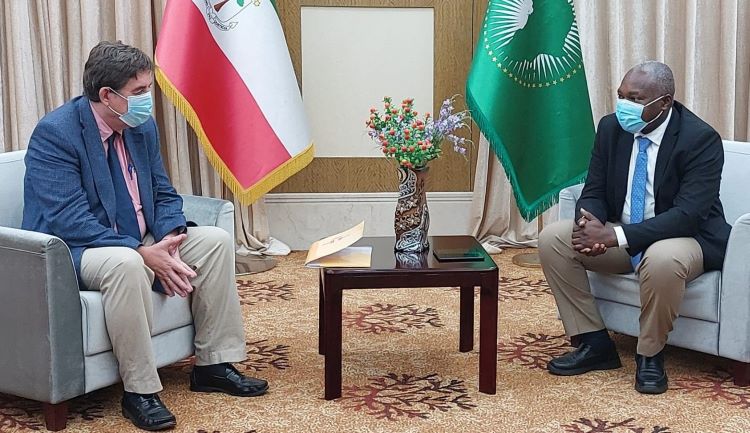The Diplomat
The director of the Instituto Cervantes, Luis García Montero, visited Equatorial Guinea this week, “the reference point for Spanish in Africa”, where he inaugurated the Tribune of Hispanism, a meeting forum for international Hispanists.
García Montero’s visit began this Thursday with a meeting with the secretary general of the Ministry of Foreign Affairs of Equatorial Guinea, Matías Nguema Mba Medja, and with the director general for Europe and America, Josefina Nguema Ayaga, who were accompanied by the Spanish ambassador in Malabo, Alfonso Barnuevo.
During this meeting, the director of Cervantes declared that “Equatorial Guinea is the reference point for Spanish in Africa, which is why joint cooperation projects are vital”. “One of them is the creation of an Observatory of Spanish in Sub-Saharan Africa, given the great interest in the region,” he added via the Institute’s official Twitter account. For his part, Matías Nguema affirmed that “Guinea is the home of Spaniards in Africa and proudly represents Spanish on the continent”, for which he said he was “very grateful that Equatorial Guinea has been chosen for this Observatory”.
Likewise, Luis García Montero inaugurated the Tribune of Equatoguinean Hispanism in the Cultural Center of Spain in Malabo, in which the president of the Equatoguinean Academy of the Spanish Language (AEGLE), Agustín Nze Nfumu, and the ambassador Alfonso Barnuevo participated and in which a round table moderated by the academic director of the Institute, Carmen Pastor Villalba, was held. This is the fifteenth edition of the Tribuna del Hispanismo program – and the second to be held outside Spain, after the one held in Dakar in 2020. Organized by Cervantes since 2017, these debates have so far analyzed British, French, Italian, Judeo-Spanish, Polish, Portuguese, German, Moroccan, Irish, Senegalese, Dutch, Russian, Thai and (last week) Canadian Hispanism.
“Those of us who appreciate Equatorial Guinea value it for what makes it special, in this case its languages, including Spanish, which is part of its identity and weaves a special bond between our cultures,” the ambassador said during the ceremony. “The Equatoguinean Academy of the Spanish Language is based on the pillars of a non-negotiable Hispanism, it defends an identity that is not borrowed from us because it is our reality, our unquestionable self,” said Agustín Nze Nfumu, “Spanish in Equatorial Guinea is not a language, it is the language,” he added.
For his part, García Montero highlighted the importance of Equatorial Guinea as “the only African country in which Spanish is a native language” and said that it would be very important for the Institute to set up the future Observatory “to study and support the consolidation in Africa of a language that today represents a very important horizon of opportunities in globalization and international cultural dialogue”. For this reason, the director of Cervantes said that the institution is working in collaboration with the Complutense University – and its relations with universities in Equatorial Guinea – to set up this Observatory in Equatorial Guinea, because it would be “very natural to start this project in a country that has Spanish as its language and has fought so hard for its importance”.
In the afternoon, García Montero gave the keynote lecture The future of Spanish in the world during an event organized by the Equatoguinean Academy of the Spanish Language at the Equatoguinean Cultural Center in Malabo.
On Friday, the director of Cervantes held meetings with the Deputy Prime Minister for Education, University Education and Sports, Clemente Engonga Nguema Onguene, and with the Rector of the National University of Equatorial Guinea (UNGE), Filiberto Ntututmu Nguema, and attended a meeting with Equatoguinean writers. Precisely, the Cervantes’ Caja de las Letras will receive next Tuesday, July 26, the legacy of writer Donato Ndongo-Bidyogo (Niefang, Equatorial Guinea, 1950), a great reference of African literature in Spanish and nominated -in a candidacy put forward by Casa África- for the Princess of Asturias Award for the Arts in 2022.






